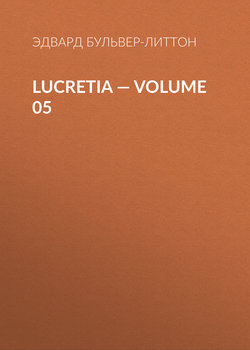Lucretia — Volume 05

Реклама. ООО «ЛитРес», ИНН: 7719571260.
Оглавление
Эдвард Бульвер-Литтон. Lucretia — Volume 05
CHAPTER VII
CHAPTER VIII
CHAPTER IX
CHAPTER X
CHAPTER XI
CHAPTER XII
CHAPTER XIII
CHAPTER XIV
CHAPTER XV
CHAPTER XVI
CHAPTER XVII
Отрывок из книги
Having once ascertained the house in which Helen lived, it was no difficult matter for St. John to learn the name of the guardian whom Beck had supposed to be her mother. No common delight mingled with Percival's amaze when in that name he recognized one borne by his own kinswoman. Very little indeed of the family history was known to him. Neither his father nor his mother ever willingly conversed of the fallen heiress,—it was a subject which the children had felt to be proscribed; but in the neighbourhood, Percival had of course heard some mention of Lucretia as the haughty and accomplished Miss Clavering, who had, to the astonishment of all, stooped to a mesalliance with her uncle's French librarian. That her loss of the St. John property, the succession of Percival's father, were unexpected by the villagers and squires around, and perhaps set down to the caprice of Sir Miles, or to an intellect impaired by apoplectic attacks, it was not likely that he should have heard. The rich have the polish of their education, and the poor that instinctive tact, so wonderful amongst the agricultural peasantry, to prevent such unmannerly disclosures or unwelcome hints; and both by rich and poor, the Vernon St. Johns were too popular and respected for wanton allusions to subjects calculated to pain them. All, therefore, that Percival knew of his relation was that she had resided from infancy with Sir Miles; that after their uncle's death she had married an inferior in rank, of the name of Dalibard, and settled abroad; that she was a person of peculiar manners, and, he had heard somewhere, of rare gifts. He had been unable to learn the name of the young lady staying with Madame Dalibard; he had learned only that she went by some other name, and was not the daughter of the lady who rented the house. Certainly it was possible that this last might not be his kinswoman, after all. The name, though strange to English ears, and not common in France, was no sufficient warrant for Percival's high spirits at the thought that he had now won legitimate and regular access to the house; still, it allowed him to call, it furnished a fair excuse for a visit.
How long he was at his toilet that day, poor boy! How sedulously, with comb and brush, he sought to smooth into straight precision that luxuriant labyrinth of jetty curls, which had never cost him a thought before! Gil Blas says that the toilet is a pleasure to the young, though a labour to the old; Percival St. John's toilet was no pleasure to him that anxious morning.
.....
"I have nothing to forgive, Mr. St. John," said Lucretia, with a softened manner. "Pardon me rather that my infirmities do not allow me to rise to receive you. This seat,—here,—next to me. You have a strong likeness to your father."
Percival received this last remark as a compliment, and bowed. Then, as he lifted his ingenuous brow, he took for the first time a steady view of his new-found relation. The peculiarities of Lucretia's countenance in youth had naturally deepened with middle age. The contour, always too sharp and pronounced, was now strong and bony as a man's; the line between the eyebrows was hollowed into a furrow. The eye retained its old uneasy, sinister, sidelong glance, or at rare moments (as when Percival entered), its searching penetration and assured command; but the eyelids themselves, red and injected, as with grief or vigil, gave something haggard and wild, whether to glance or gaze. Despite the paralysis of the frame, the face, though pale and thin, showed no bodily decay. A vigour surpassing the strength of woman might still be seen in the play of the bold muscles, the firmness of the contracted lips. What physicians call "vitality," and trace at once (if experienced) on the physiognomy as the prognostic of long life, undulated restlessly in every aspect of the face, every movement of those thin, nervous hands, which, contrasting the rest of that motionless form, never seemed to be at rest. The teeth were still white and regular, as in youth; and when they shone out in speaking, gave a strange, unnatural freshness to a face otherwise so worn.
.....